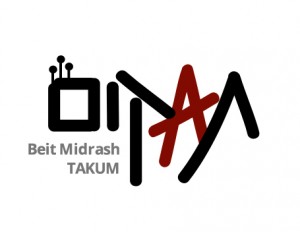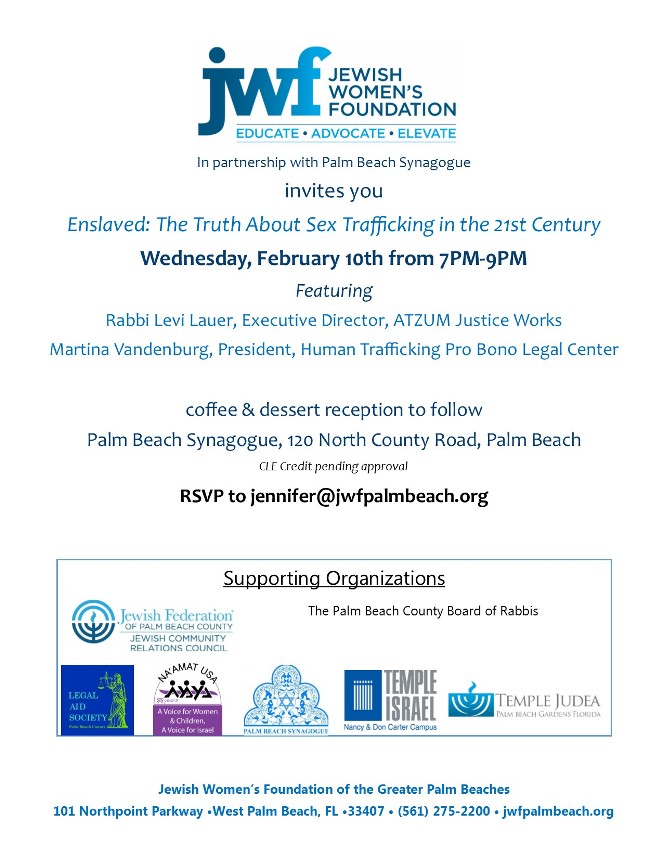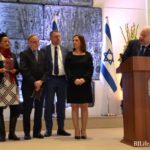Archives for 2015
Rabbi Levi Lauer: Condemning recent violence, translating words into deeds
Eye on Education
If Jews exclusively devote themselves to even the best Torah study, they risk becoming recluses within universities, libraries, classrooms and the beit midrash. Alternatively, if they only seek to become social activists without grounding such activism in traditionalist learning, their voices and actions often lack Jewish resonance.
To remedy social injustice and inequity in Israel society and encourage individuals to become agents of change, ATZUM-Justice Works synthesizes formal learning with activism towards resolving severe community crises. Whether working in Israel, locally or around the globe, ATZUM urges those committed to Jewish learning to take the Torah to the streets and act decisively to help “the other”.
In this issue of our newsletter, we focus on the following educational and service-learning programs.
International Street Torah: The TAKUM (tikkun u’mishpat/restoring justice) International Social Justice Beit Midrash is a ten-month program combining in-depth study of Jewish texts with social activism. The initiative was founded by ATZUM in partnership with Yeshivat Talpiot, an Israel NGO that encourages engagement in critical and open discussion of religious life and politics as a means to enrich activist endeavor.
TAKUM was launched in 2014 in Israel, the U.K. and the U.S. In 2015, 58 TAKUM Fellows are participating in two cohorts in both Jerusalem and London. TAKUM is also teaching a small group working with the Gabriel Project Mumbai, an NGO providing hunger and medical relief and basic education to vulnerable children living in that city’s most deprived slums.
What’s in a Name? By claiming Jewish text as a touchstone for improving society, TAKUM brings together learning and action. TAKUM embodies the following principles:
- Takum (raising consciousness and engaging street activism): TAKUM inspires young activists to wake up to the resources available within Jewish tradition to inform grassroots outreach. Be it working to protect human rights or the environment; eradicating poverty or illiteracy; or assisting at-risk individuals who lack power or a voice to act and speak for themselves, TAKUM motivates activists to address social problems and stand up for others.
- Tikkun (forging a connection between learning and action): How do I prioritize projects? Where do I spend my energies? Who most needs my help? Though constantly asked by activists, if not systematically confronted, such questions can blur focus and frustrate the search for best practices. TAKUM’s program of text study helps activists clarify issues of power, privilege, responsibility, gender politics, and community boundaries. By learning while doing, TAKUM encourages the individual to enjoin rhetoric with action.
- U’Mishpat (restoring justice and sustaining social change): Studying classical Jewish sources helps activists imagine creative solutions to contemporary problems such as how to divide water resources, secure gender equality, or integrate “the other,” such as asylum seekers, within society. Through learning, TAKUM participants arrive at new ideas and acquire the language and structures necessary to re-frame the issues dealt with in the field. Attention to Jewish law, in particular, provides TAKUM Fellows radical mechanisms for deep and lasting change.
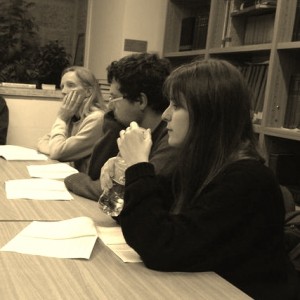 TAKUM Fellows: The TAKUM community consists of experienced social-change professionals and grassroots volunteers. Fellows learn weekly in havruta (partnered learning) and in formal shiurim (group lessons) in TAKUM’s open, respectful and critically engaged environment. In lieu of tuition, Fellows are obligated to volunteer five hours weekly on behalf of some of their communities’ most at-risk residents.
TAKUM Fellows: The TAKUM community consists of experienced social-change professionals and grassroots volunteers. Fellows learn weekly in havruta (partnered learning) and in formal shiurim (group lessons) in TAKUM’s open, respectful and critically engaged environment. In lieu of tuition, Fellows are obligated to volunteer five hours weekly on behalf of some of their communities’ most at-risk residents.
Current participants include individuals who have already taken to the streets to address local and global issues, among them educators; lawyers; local and visiting rabbinic students; musicians (including one professional involved in Heartbeat, a music dialogue organization for Israeli and Palestinian youth activists); and those aiding girls and women in distress, including one Fellow who spent two years working with Ultra-Orthodox girls with eating disorders, now a volunteer at the Jerusalem Rape Crisis Center. A number of Fellows have volunteered their time helping distressed populations around the world working in a rural village in Nepal, and as part of the American Jewish World Service volunteer corps in La Ciudad Romero, El Salvador.
To find out more about becoming a TAKUM fellow, or to invite Rabbi Levi Lauer of ATZUM and Shoshana Cohen of Yeshivat Talpiot to your community, please contact Kayla Rothman-Zecher.
Related Blog Postings:
From Mumbai: In the words of Rose Pollard, Gabriel Project Mumbai/JDC Entwine Fall 2014 Fellow.
From London: In the words of Maytal Kuperard, JHub Communications and Community Animator.
Working with Visiting Diaspora Young Leadership
In the fall of 2014, ATZUM launched a year-long service-learning program for a group of students in their 20’s and 30’s affiliated with the Jerusalem-based Pardes Institute of Jewish Studies. In addition to their formal learning, these young adults from different Jewish backgrounds and Diaspora communities are volunteering with ATZUM’s Task Force on Human Trafficking.
Participants take part in a weekly course focusing on the connection between human trafficking and sexual servitude through prostitution with the aim of encouraging informed activism towards their abolishment. ATZUM’s Rebecca Hughes, who developed and teaches the course, notes its objectives are: “…to provide future Jewish leaders with the tools to intelligently and thoughtfully discuss and act upon these issues.” Like their Israeli counterparts, most students had no idea that trafficking and prostituting girls and women are part of the narrative of the Jewish State.
Hughes adds, “I’ve been impressed with the group’s willingness to learn about and discuss these difficult, abhorrent issues and bring them to the attention of their peers at Pardes and beyond. For them, studying the issues have not been enough; they want to act, to be a part of the solution. This is a huge part of what we hoped would transpire. I’m confident that at the end of this year they will continue their activism on these issues.” Indeed, one participant who blogged about the program notes: “I think my newly acquired knowledge and that of my fellow volunteers can only help the world as we seek to further educate our communities.” Most recently, participants organized an evening of learning at Hebrew University in partnership with Rabbis for Human Rights and Hillel.
Related Blog Postings:
In the words of Darya Watnick, Pardes Institute of Jewish Studies program participant and Task Force on Human Trafficking volunteer.
Human Trafficking Into Israel: The Return of a Trend in the Guise of Tourism?
While Israel changed its policies at the urging of the international community and NGOs such as ATZUM, distancing itself from its previous disregard of cross-border human trafficking, trafficking in persons into and within Israel continues.
Indeed, Israel’s failure to address trafficking and prostitution within its own borders is clearly outlined in the American State Department 2014 Trafficking in Persons (TIP) Report, which calls for increased investigation of prostitution of Israeli nationals and stronger sentencing for convicted traffickers.
However, after ATZUM helped lead a successful campaign to reduce trafficking into Israel over the Sinai border, a new phenomenon has emerged. Traffickers and pimps, undeterred by the obstacle of a 245-mile fence now dividing the two countries, are getting creative.
In April 2015, police investigated complaints of individuals suspected of raping and pimping young women in a Holon apartment. The investigation exposed a sophisticated network that systematically “imported” women from Eastern Europe to Israel to work as prostituted sex slaves. The suspects allegedly brought women from Eastern Europe to Israel on tourist visas, but soon forced them into sexual slavery. Often the case, such women are duped and at the mercy of their abusers. This incident comes on the heels of a 2014 extended undercover police operation which revealed the existence of an Israeli-Ukrainian-Russian crime ring that trafficked women into Israel to work as sex slaves. The cover story was that the women were arriving for medical tourism.
If Israel is serious about reducing sex trafficking, closing its borders is a critical but not exhaustive strategy. To be sure, trafficking and pimping are only profitable as long as customers are able to purchase prostitution services, making it imperative Israel criminalize such behavior. ATZUM will reassert its past efforts to assure public attention is redirected to this issue and those responsible for anti-trafficking enforcement are held accountable.
Post-Election Implications for Passing Nordic Model Legislation
Israel’s 20th Knesset was sworn in on March 31, 2015 with 40 first-time MKs, a record 28 women, and new political parties. Of particular concern to the Task Force on Human Trafficking (TFHT) is whether this government will support or thwart TFHT’S multi-year campaign to pass legislation based on the Nordic Model, the international standard designed to criminalize the procurers and purchasers of sexual services and protect the prostituted person.
Unfortunately, two of TFHT’s dedicated partners in the 19th Knesset, MK Shuli Moalem-Refaeli (HaBayit HaYehudi) and MK David Tzur (HaTnua), were not re-elected, though MK Zehava Gal-On (Meretz), unwavering in her commitment to eradicate demand for trafficking and prostitution, and a past sponsor of legislation based on the Nordic Model, was again elected.
Prior to the elections, TFHT partnered with Mythos and The Jerusalem Institute for Justice to survey political party positions on the Nordic Model: the Zionist Union, Yesh Atid, HaBayit HaYehudi, and Meretz each publicly declared their support, signaling hope as we address the challenges ahead.
Between the folding of the previous Knesset and the formation of the current government, TFHT worked to redraft more comprehensive legislation than previously proposed. The new bill, more holistic in its approach to reducing sex trafficking and prostitution, calls for appreciable assistance to be provided to people exiting prostitution.
Simultaneous to our legislative activities, we are ramping up the work of our 383-strong Project 119 grassroots volunteer corps. Project 119 volunteers from around the world, who kept the issue front and center between governments, are now accelerating their weekly online advocacy campaign with MKs and ministers to push the new Knesset to act.
Having urged passage of Nordic Model legislation in Israel during three consecutive governments, TFHT remains the lead organization focused on bringing about sustained change at the policy level and holding accountable those tasked with implementing the bill when it becomes law. In this effort, we are pleased our long-term relationships with law firm Kabiri-Nevo-Keidar, TFHT co-founder, and advertising company Y&R-Israel remain strong. What we know for sure: however long and rutted the road to change, it is unacceptable for Israel society to accept the current reality in which the purchase of sexual abuse of girls and women continues.
NOTE: Those curious about how voting works in Israel can learn more here; results of the country’s March 2015 elections can be found here (English) and here (Hebrew).
ATZUM: Engaging Pardes Students in Service-Learning Program
For the past several months, a group of students from the Pardes Institute of Jewish Studies has been volunteering for the Task Force on Human Trafficking, an initiative of ATZUM-Justice Works whose professionals have prepared an informative orientation course for social activists. As newcomers to the issues of prostitution and trafficking addressed by the Task Force, we initially sought to understand and ultimately enlighten others about these problems.
Since the fall of 2014 we’ve learned and accomplished a great deal. Our group prepared a short presentation for the Social Justice class at Pardes, screened documentary clips highlighting the issues, and facilitated a probing discussion for the larger Pardes community. Later this month we will be hosting a Trivia Night focusing on women’s issues. Our most significant undertaking has been to create a series of lesson plans to help educators introduce students to the topics and to encourage them to work towards remedies. Many of us spent countless hours watching documentaries, reading articles and planning activities in order to compile the best resources and methods to teach about these difficult issues.
Tackling and digesting these issues has not been easy. I have come away from some meetings feeling thoroughly disheartened. Without initially realizing it, I now see that my discussions surrounding trafficking and prostitution have changed. I used to keep quiet, feeling as if I had nothing worthy to contribute to the conversation and no obligation to take a stance. But now, because of the course, I have the confidence to state my opinion and the language and statistics to back it up. Even if my short time working with the Task Force is only a blip on the screen of the larger struggle, I think my, and my fellow volunteers’, greater knowledge can only help further educate our communities.
Darya Watnick
Pardes Institute of Jewish Studies program participant
Task Force on Human Trafficking volunteer
Israel Elections and “Hyde Park” Discourse
For the past three years, ATZUM’s Task Force on Human Trafficking (TFHT) has worked to gain passage of legislation based on the Nordic Model, the international standard designed to criminalize the purchase of sexual services and protect the prostituted person, nearly always a girl or woman victim of childhood rape and/or incest. In February 2015, in partnership with the Association of Rape Crisis Centers in Israel, TFHT organized a panel discussion in which candidates for the upcoming Knesset (to be elected March 17) outlined their plans for addressing all forms of sexual violence, including prostitution and trafficking.
Eighty people came on a blustery winter night to attend the Jerusalem event billed as a “Hyde Park” discussion, referencing the iconic “Speakers’ Corner” in London. Candidates from nine parties of disparate political positions vying for Knesset seats participated, including:
Rachel Azaria (Kulano)
Dr. Anat Berko (Likud)
Ruth Colian (B’Zhutan)
MK Yifat Kariv (Yesh Atid)
MK Orly Levi-Abekasis (Yisrael Beitenu)
MK Shuli Moalem-Refaeli (HaBayit HaYehudi)
Ayelet Nahmias-Verbin (Zionist Camp)
MK Michal Rozin (Meretz)
Aida Touma-Sliman (The Joint List)
The candidates spoke of the need for the next Knesset to combat sexual violence and prostitution in Israel society. Indeed, multi-partisan collaboration will be key to ensuring that legislation is passed protecting girls and women from sexual servitude through prostitution. Notably, during the previous Knesset, TFHT successfully created an alliance of three MKs from different parties across the political spectrum firmly committed to advancing the Nordic Model.
Michal Leibel, lawyer and TFHT Director, said at the event: “The understanding that prostitution is a form of sexual violence and that it should be treated as such is now beginning to enter Israeli discourse. This leads to the only possible conclusion: to truly reduce prostitution, society must act as decisively against sex-buyers as against pimps.”
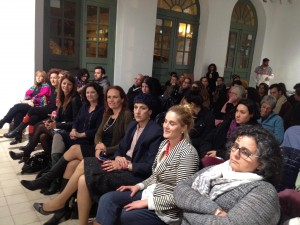
PHOTO. Hyde Park Event: Front row (right to left) MK Candidate, Aida Touma Sliman (the Joint List); Liat Klein, legal advisor of the Association of Rape Crisis Centers in Israel; MK Shuli Moalem-Refaeli (HaBayit HaYehudi); MK Yifat Kariv (Yesh Atid); MK Michal Rozin (Meretz) and MK Orly Levi-Abekasis (Yisrael Beytenu)
TIP Report
TFHT was invited to contribute to the U.S. State Department’s Trafficking in Persons (TIP) 2015 Report, a process which allowed us to share our concerns related to the policies and actions of the Ministry of Interior and its adjunct bodies, and their need to act further to protect victims of trafficking.
The annual TIP Report evaluates and ranks governments based on perceived efforts to acknowledge and combat human trafficking. The report assigns countries tiers according to compliance with standards outlined in the Trafficking Victims Protection Act. Israel should take pride in the progress made since 2001, when it received the report’s lowest ranking. Since then, with the help of NGOs such as ATZUM, various forms of trafficking, especially sex trafficking, have decreased.
Yet, while Israel has succeeded in drastically reducing sex trafficking originating in other countries, it has failed to address the prostitution that occurs within its own borders. This is clearly outlined in the 2014 TIP Report, which calls for the need for increased investigations of prostitution of Israeli nationals and stronger sentencing for convicted traffickers.
Surviving a Terror Attack – Two Personal Stories
A total of 1,265 people have been killed as a result of terrorism since September, 2000; thousands more have been injured. For the bereaved and the physically and psychologically wounded, the trauma persists.
These are the stories of a young woman who lives with the haunting memory of how life changed in a split second when she survived a brutal terror bombing; and of a young boy whose severe trauma following Operation Pillar of Defense (2012) was retriggered during the 2014 Gaza War. ATZUM, through the Roberta Project for Survivors of Terror, provides assistance to these people, and many others whose needs are insufficiently met by public and/or private resources.
Surviving a Suicide Bus Bomb Attack
It began early Sunday, February 22, 2004. I was 13 years old. That morning I was getting my little brother ready for kindergarten. My father offered to give me a lift to school. Not wanting to hold him up, I told him to leave without me and I’d catch a bus as usual. Once on my way, rushing to school, I saw bus number 14 pass and waited for the next one.
That period of the second intifada was a time of many terror attacks. Three weeks prior, 11 were killed and 51 wounded in Jerusalem’s Rehavia neighborhood when a suicide bomber exploded himself aboard a bus. Such news had become routine.
After boarding the next bus, I noticed another passenger whose appearance seemed suspicious. Wearing a large green coat and jeans, he was clutching a big black bag. I turned to the gentleman sitting next to me and told him I thought I’d sighted a bus bomber. He told me to get off the bus as soon as possible. When I made the move to stand up, the terrorist pushed me back onto the seat, forced the bag filled with explosives onto me, held me with one arm and detonated the bomb with his other.
I remained fully conscious. All I could see was blood; then I began to focus on the other passengers, some dead, others shouting. Oddly, despite the screams, for a time it was deafeningly quiet.
I tried to stand, but fell, not sure if I’d lost my legs or if they just would not respond. I attempted unsuccessfully to lift myself up to escape through the window. Cutting myself on the shattered glass, I dragged myself forward. Though I’d only made it a few feet, I ran out of strength, finding myself next to a soldier who placed his head on me and closed his eyes forever.
As soon as Magen David Adom emergency teams arrived, a paramedic lifted me and tried to find out how to contact my parents. Their reiterated, at first irritating, questions kept me conscious, and probably saved my life. I was rushed by ambulance to the hospital where I was in a coma for two weeks.
Over time I came to understand that my injuries, defined as extremely critical (the most serious of the attack), included collapsed lungs, shrapnel in my head and hands, a fractured skull, third degree burns on my face and hands, and two torn eardrums. Recovery and hospitalization would be difficult and long. Once I was stable, I was transferred to the surgery department for continuing treatment.
After a month, I was finally released from the hospital. I then underwent eight months rehabilitation, re-learning how to speak, eat on my own, crawl and eventually walk without falling; in short, everything learned during the first years of life. As I had also missed two years of education owing to my extensive rehabilitation, I eventually returned to my studies.
Today, the worst of the injuries are behind me. I finished my schooling and my national service, worked at a variety of jobs and recently began my B.A. in human resources. The support received from the National Insurance Institute helps, but does not enable me to pursue the studies of my choice. I am fortunate ATZUM filled this gap, providing me with direction and a much needed computer. I have greatly benefitted from ATZUM’s determination to aid people like me who have not received sufficient assistance elsewhere.
Terror times two*
Single parent Moran and her two sons, Yossi, serving in the IDF, and Ami, in second grade, live in Sderot, a town in Israel’s south that has been recurrently bombarded by Kassam rocket and mortar fire from Gaza since April, 2000. Moran, with a minimum-wage job, does her best to support her children financially and emotionally, though their lives are very difficult. November 14, 2012, marked the beginning of “Operation Pillar of Defense”, a military response to extreme escalation of rocket fire into the region. That day the family’s situation took a turn for the worse.
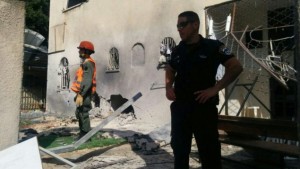 As Moran was walking Ami to school, a rocket landed near them. They quickly ran to a neighbor’s home and hid in his shelter until the all-clear signal sounded. It took considerable effort for his mother and the neighbor to calm down Ami and get him to agree to exit the shelter.
As Moran was walking Ami to school, a rocket landed near them. They quickly ran to a neighbor’s home and hid in his shelter until the all-clear signal sounded. It took considerable effort for his mother and the neighbor to calm down Ami and get him to agree to exit the shelter.
Though accustomed to such routine, this near-miss proved devastating. Ami developed severe anxiety, suffered numerous physical ailments, and refused to leave the house or his mother’s side. He was diagnosed with PTSD, for which he was professionally treated.
Less than two years later, July 8, 2014, Operation Defensive Shield (the 2014 Gaza War) was launched to again halt rocket fire from Gaza into Israel. Ami’s PTSD retriggered and worsened, rendering him emotionally unstable and incapable of starting the school year. Today, more than six months after the conclusion of the war, Ami still receives intensive therapy and medication to help tackle life’s daily challenges and treat the chronic bladder and bowel dysfunction connected to his PTSD. Moran also receives parental guidance and social support to develop tools to deal with the situation.
While receiving assistance from many sources, a number of critical needs remain unattended. ATZUM is providing emotional as well as financial support to buy clothing and school supplies and to enable Ami to participate in a number of social and after-school activities. We will remain closely connected to the family to respond to other needs that may arise.
=======================
Since 2002, ATZUM’s Roberta Project for Survivors of Terror has facilitated the transfer of $1.25 million in aid, grants and loans to meet subsistence, educational and dental care needs of terror survivors and family members. The Project provides direct assistance to families whose lives have been irreparably shattered, particularly those whose main provider or child was the victim. While we also assist survivors of the most recent violence, ATZUM specifically works to identify survivors from long-forgotten attacks who are not receiving adequate assistance and are often overlooked by programs of assistance focused on more recent cases.
Event: Fighting Sexual Violence Together!
Here in Israel elections are coming up and everyone has an important decision to make about which party to vote for. If you care about advancing women’s rights, then join ATZUM’s Task Force and The Association of Rape Crisis Centers in Israel on Sunday, February 15th to hear what the parties have to say about these important issues.
Singer songwriter Shimrit Greilsammer will kick the event off with music from her new album. The concert will be followed by a panel discussion with candidates from across the political spectrum.
Panelists include:
MK Shuli Moalem-Refaeli HaBayit HaYehudi
MK Yifat Kariv Yesh Atid
MK Orly Levi-Abekasis Yisrael Beitenu
MK Michal Rozin Meretz
Dr. Anat Berko Likud
Revital Swid Zionist Camp
Rachel Azaria Kulano
Aida Touma-Sliman The Joint List
Ruth Colian B’Zhutan
When: Sunday, February 15th 19:00 – 21:30
Where: HaTachana HaRishona – David Remez 4, Jerusalem
For more details see our event on Facebook:
https://www.facebook.com/events/389298404581450/?ref_newsfeed_story_type=regular
* We hope to see you all there!
ATZUM’s Activist Beit Midrash TAKUM Reaches Mumbai
Learning Torah; backdrop, the slums of Mumbai
Udaipur, India December 2014
Rose Pollard, GPM JDC Entwine Fall 2014 Fellow
For the past 2 months, I spent my time teaching informal education classes in a slum called Kalwa, just outside of Mumbai. As I taught, sang, and laughed in the tin-hut classrooms with my students, their eagerness and earnest expressions brought me moments of pure fulfillment. The kids’ integrity, cooperation, and joy was humbling, given the conditions of the slum around them. The images I saw every day walking to class still stick with me – naked children scampering across trash piles, pigs, goats and chickens running rampant, and families of 10 living in single, tiny rooms. It was hard to filter the difference between the comforts I am used to and the reality for those in the slums of Mumbai.
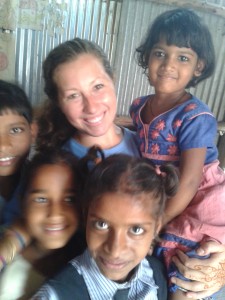 The organization I worked with, Gabriel Project Mumbai (GPM), helped me process the contrast. GPM organized Jewish learning classes on social justice with TAKUM led by Shoshana Cohen and Rabbi Levi Lauer. Taking time to learn Torah allowed my cohort and me to take a step back from the overwhelming images and experience in Kalwa. The learning urged us to question the big picture and ask: Why are we here again? What influences brought us to India in the first place, and why is being here important?
The organization I worked with, Gabriel Project Mumbai (GPM), helped me process the contrast. GPM organized Jewish learning classes on social justice with TAKUM led by Shoshana Cohen and Rabbi Levi Lauer. Taking time to learn Torah allowed my cohort and me to take a step back from the overwhelming images and experience in Kalwa. The learning urged us to question the big picture and ask: Why are we here again? What influences brought us to India in the first place, and why is being here important?
As soon as we started reading Torah with Shoshana, I smiled, comforted by the sounds of Hebrew and the transition to analytical thought. We discussed the power of creation – in its definition, in G-d, in ourselves and in every human being. It reminded me of the power I hold as a teacher to shape each lesson and affect a child’s life. Shoshana also urged us to share what made us decide to work with GPM, reconnecting us with what we wanted to get out of the experience.
Our time with Rabbi Lauer combined the theories of spiritual ideas to our physical work in the slums and vulnerable children with vital significance. He led us through thoughts of leadership, justice, and motivation. One concept he spoke of was the necessity to “pursue meaning, instead of comfort.” I have since considered this idea many times, asking myself: how can I push the boundaries of discomfort to pursue growth – both in the communities I touch and myself? Rabbi Lauer’s session revealed that this question has been asked for eons, and the struggle of finding and pursuing meaning is everywhere in Jewish text.
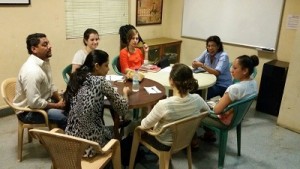 The sessions allowed my fellow volunteers and me to connect on a deeper level. As my new friends piped up around me, engaging and offering insightful thoughts, I felt a new appreciation for each of them. After spending so much time living, planning, and joking with one another, we were suddenly relating in a new way. Bouncing off one idea to another, we were able to appreciate each other intellectually, which for me added a meaningful layer to our cohort.
The sessions allowed my fellow volunteers and me to connect on a deeper level. As my new friends piped up around me, engaging and offering insightful thoughts, I felt a new appreciation for each of them. After spending so much time living, planning, and joking with one another, we were suddenly relating in a new way. Bouncing off one idea to another, we were able to appreciate each other intellectually, which for me added a meaningful layer to our cohort.
The discussions were invigorating and I left each session with new energy to bring to the classroom. I gained perspective on the discomforts and contrast in the slum– urging me to seek the meaning beyond it. From the steadfast sense of community to the boundless happiness of my students, there is so much to learn from those in Kalwa. I have Rabbi Lauer and Shoshana to thank for helping me to seek this meaning and allowing it to bring profound personal growth to my time with GPM.




